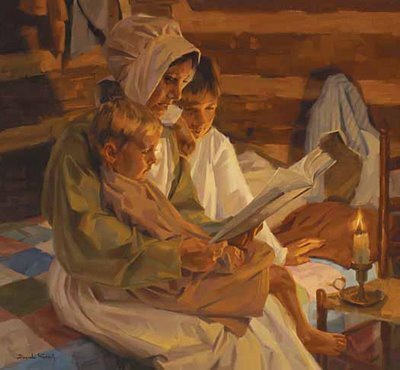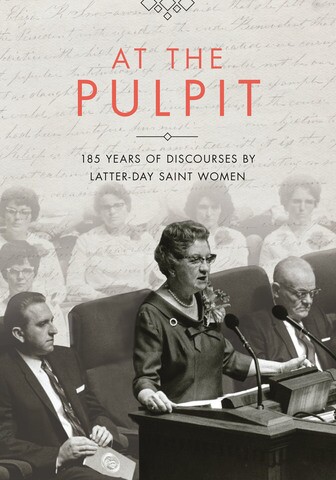The following is a part of Lucy Mack Smith's general conference address on the temple grounds in Nauvoo, Illinois, on October 8, 1845, a year after the death of Joseph and Hyrum Smith. This speech is the first account of a woman speaking at general conference and is part of the unprecedented Church history book At the Pulpit, which you can access for free on lds.orgor on your gospel library app. At the Pulpit spans 185 years of Church history and includes more than 50 groundbreaking discourses from LDS women.
After the church began to grow we were driven from one place to another, to Kirtland then to Missouri. William was taken sick, Samuel’s wife and others; and I had twenty or thirty sick to take care of during the mobbing. I felt strong in health. I could take care of thirty sick then better than sit on my chair now.
While William lay sick he had a vision and saw the mob come in. He said he saw them come in thousands and thousands, and he said, “Mother, you will be driven,” and, says he, “If I die I want you to take care of my wife. I want you to carry my corpse wherever you go.” The first day William was able to walk as far as the door, the mob came. Ten of them came into my room after they had taken Joseph and Hyrum into their camp. There were thousands of them hallooing and screeching in my ears. How do you think I felt? Have you any feelings for me?
While they were in the camp I could not go to see them, and now my children are in the grave. Ten men came in and said, “We have come in to kill the heads of the family.” Says I, “Do you want to kill me?” They said yes. I said, “I want you to do your work quick, for I would then be happy.” They then said, “God damn it, these Mormons had as lief die as live.” They then tried Joseph and Hyrum and sentenced them to be shot in 15 minutes. A man came in and said, “Mother Smith, if you ever want to see Joseph again you must go now, for he is going to be shot in Jackson County.” He took me by the hand, and it was as much as we could do to get through the crowd to the wagon.
The men lifted up their swords and swore I should not see them. I finally got to the wagon and put up my hand. He took hold of my hand and kissed it. I said, “Joseph, let me hear your voice once more.” Said he, “God bless you, my poor Mother.” They were taken away. They were in bands and irons. All this time my son William and his wife were sick. Samuel’s wife was sick and some others, and I had them all to take care of. After that we had to move.
Joseph then went to the city of Washington. It rained three days as hard as it could rain, but we had to travel and nothing to shelter us. I walked 6 miles in the bottom. My clothes were wet so high up I could scarcely walk, and when we got to the Quincy River it snowed, it rained, it hailed. We lay our bed on the cold snow and a blanket over us and took off our wet stockings and did the best we could. In the morning the cover was frozen stiff. We could not make a fire for the snow. Joseph then went to the city of Washington, as he had a revelation to importune at the governor’s feet and the president’s feet, and the Lord said if they would not heed him he would vex the nation. When he got home he preached down between Mr. Durfee’s and the Mansion House. He told the brethren and sisters that he had done all he could for them. Says he, “They are determined we shall not have justice while we stay in Nauvoo.” But, says he, “Keep good courage. You shall never suffer for bread as you have done before.” Said he, “All these cases are recorded on earth, and what is recorded here is recorded in heaven. Now,” says he, “I am going to lay this case of their taking away our property, etc. I am going to take it up before the highest court in heaven.” He repeated it 3 times. Little did I think he was going to leave us so soon to take this case to heaven. We never could get justice till he took it there.
The Lord has got even the marshal there. They know all our sufferings and don’t you think our case is being tried? I think they will do more for us there than they could if they were here. I feel that if every soul would stay at home they would be blessed. I feel as though God is vexing the nation a little here and there, and I feel that the Lord will let Brother Brigham take the people away. I don’t know as I shall go, but if the rest of my family go I will go, and I pray that the Lord may bless the heads of the church, Brother Brigham and all of you, and when I go to another world I want to meet you all. Here lays my dead, my husband and children. I want to lay my bones here so that in the resurrection I can raise with my husband and children, if so be that my children go. And I would to God that all my children would go. They will not go without me, and if I go I want to have my bones fetched back to be laid with my husband and children.
Lead image from ldsblogs.com
Read At the Pulpit for free here. Or toown a beautiful hard copy of the book, purchase it here.
From the banks of the frozen Lake Erie in early May 1831, Lucy Mack Smith admonished her despondent fellow Saints. "Where is your faith in God?" she asked. "If I could make my voice to sound as loud as the trumpet of Michael the archangel I would declare the truth from land to land and from sea to sea."
At the Pulpit contains 54 discourses given by Latter-day Saint women throughout the history of The Church of Jesus Christ of Latter-day Saints. Like Lucy Mack Smith, these women drew on inspiration and experience to declare their understanding of eternal truths. The book provides a resource for contemporary Latter-day Saints as they study, speak, teach, and lead.
The voices in these pages ring from Nauvoo's red brick store to the National Auditorium in Mexico City to the Tabernacle on Temple Square and beyond. These discourses offer instruction on gospel principles while also revealing the particular concerns of individual women. At the Pulpit allows us to hear the historical and contemporary voices of Latter-day Saint women—voices that resound with experience, wisdom, and authority.


